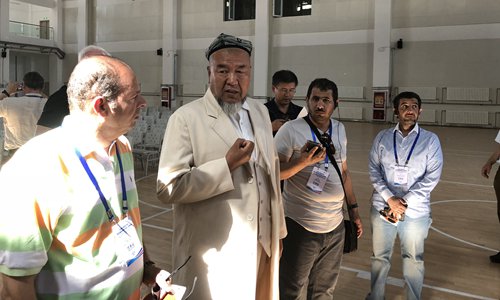Northwest China’s Xinjiang Uygur Autonomous Region welcomes people from all around the world, including officials from the new US administration, to visit but it opposes any presumption of guilt, senior officials from the region told a press conference in Beijing on Monday.
Analysts said that China’s attitude toward foreigners’ visits to its Xinjiang region is always open and consistent despite some of them trying to verify presumptions. Welcoming US officials to visit Xinjiang showed that China hopes the Biden administration would not repeat the mistakes of the Trump administration in using Xinjiang topics to further damage bilateral ties.
“We welcome people from all fields around the world, including officials from the new US administration, to visit Xinjiang to learn what is really happening there and avoid being fooled by Pompeo’s lies,” Xu Guixiang, a deputy director-general of the publicity department of the Xinjiang Regional Committee of the Communist Party of China (CPC), said on Monday.
We also have a bottom line and firmly oppose any so-called investigation with a presumption of guilt, said Xu.
Former US secretary of state Mike Pompeo on January 19 — his last day in the job — tweeted that he had “determined” that China is “committing genocide and crimes against humanity” in Xinjiang against Uygurs and other ethnic groups, and he wrote that China and the CPC “must be held to account.”
Xu said that Pompeo’s accusation was “the largest instance of framing someone in human history… his determination is a piece of waste paper.”
China’s attitude to welcome foreigners to visit its Xinjiang is consistent and open, although some foreigners never abandoned their bias and tried hard to verify their presumptions of guilt during or before visits to the region, Jia Chunyang, an expert at the China Institutes of Contemporary International Relations, told the Global Times on Monday.
Xinjiang’s senior officials’ remarks and invitations to US officials from the new administration also showed that they hope US President Joe Biden and his team would not follow the wrong path of the Trump administration in hyping Xinjiang topics to further damage bilateral ties, Jia said.
Although bearing hopes of the Biden administration being more rational and normal, Chinese experts also warned that the US would not give up using the topics of human rights and religious freedom to contain China, but currently Biden is fully engaged in dealing with the domestic epidemic.
The US State Department is reviewing the Trump administration’s determination that China has committed “genocide” in its Xinjiang region to make sure that it sticks, Biden’s pick for UN ambassador was cited by Reuters as saying on Wednesday. Later on the same day, a bipartisan group of US senators said they had reintroduced legislation intended to bar any goods made with “forced labor” in Xinjiang from entering the US.
Biden’s Secretary of State, Antony Blinken, told the Senate Foreign Relations panel during his confirmation hearing last week that he agreed with the genocide declaration, Reuters reported.
“Biden would not reverse the ‘determination’ since it may bring major political risks as an anti-China stance has become a bipartisan consensus. Anti-China hawks in the US Congress would also not give up pushing legislation to contain China, to which China should keep alert,” Jia said.
Analysts also noted that if Biden decides to impose more sanctions on China by hyping Xinjiang topics or colluding with US allies in containing China under the excuse of policies in Xinjiang, it would not be a good way to improve ties with China, nor would it help the US win back the moral high ground it lost a long time ago.
“Actually, it is the US and a few Western countries that are pushing the ‘genocide’ lies. The majority of the international community has never brought it. Moves by China’s central government and the Xinjiang regional government to refute these lies are correct and necessary to avoid more people being fooled,” Jia said.
The Monday’s press conference was the third on Xinjiang-related issues held by the Foreign Ministry in Beijing, with a dozen representatives from domestic and foreign media from the UK, the US, Indonesia and Japan in attendance. The Xinjiang regional government has held a number of press conferences since the end of 2019, clarifying heated topics in related to Xinjiang.
“Our press conferences do not aim to criticize a certain individual or country. Instead, we want more foreign media organizations to know the real Xinjiang,” Xu told the Global Times on Monday.
He noted that through communication, some misunderstandings about Xinjiang had been dispelled.
“Practice has proved that many policies adopted in Xinjiang are effective and worth being learned. I also suggested to some media that instead of taking a jaundiced view of Xinjiang, they should think more on how the region achieved stability and development.”
“We welcome foreign reporters to visit Xinjiang at any time,” Xu said.
Abudurekefu Tumuniyazi (center), head of the Xinjiang Islamic Association and the Xinjiang Islam Institution, discusses China’s religion protection policies to foreign visitors in July 2018. Photo: Liu Xin/GT


